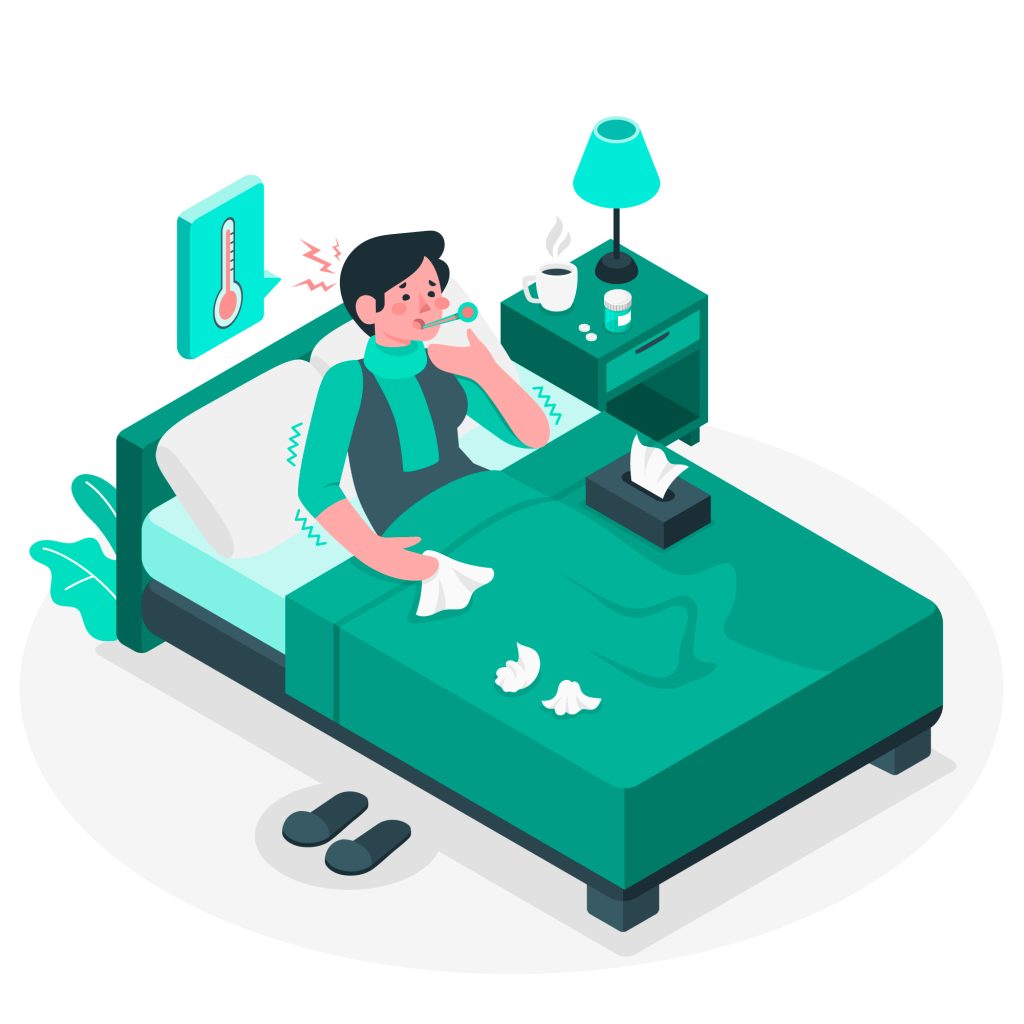
Therapy for Hypochondria
Hypochondria, or a fear of illness can make you feel worried about falling ill or having an illness. This can leave little space for you to enjoy life for what it is. However, therapy can certainly help you overcome hyperchondria.
We are here for you.
35000
Sessions
22+
YEARS EXPERIENCE
500000+
LIVES IMPACTED
Hypochondria: Fear Of Illness
Hypochondria is known by different names, such as: Health Anxiety, Fear of Illness, and Illness Anxiety.
Your fears about your health can feel very real, uncontrollable, and can often cause you to misread normal bodily functions to be an indication of a serious illness. You may feel like you are sick despite constant reassurance from people in your life and health-care providers that you are healthy. Thus, fearing that you are seriously ill can cause you to be preoccupied with your health, leading to anxiety.
Anxiety about your health can be highly distressing. It can affect your personal, school, or work life. Therefore, managing these fears and having a healthy perception about your health is important to lead a peaceful and fulfilling life.
Our Approach to Help You Manage Your Hypochondria
Most people search for a “treatment” to manage their health anxiety, while therapy for health anxiety should not be seen as a treatment. Rather, it needs to be viewed as an exploration and addressing of underlying causes and symptoms of anxiety.
Anxiety is like a signal. It tells us when the system is vigilant, overwhelmed and dysregulated. At the outset it may appear that the anxiety is related to a worry about the future, a particular incident, an irrational fear or even a generalized feeling of dread. However, therapy often shows that the roots of anxiety go way deeper. It can be an emotion that we are unwilling to face, or it can be trauma that is unseen and unaddressed from our past.
At Inner Space, our therapists who work with anxiety, address both the manifested symptoms of anxiety as well as the underlying causes of anxiety. We explore the anxiety triggers using cognitive-behavioral therapy. With the help of somatic psychotherapy, mindfulness-based therapy and meditation practices, we help the client to address the emotional overwhelm and start to regulate their nervous system.
Regulating the physiology of the body and the nervous system is crucial to going deeper. Once the overall nervous system feels a bit settled, there is possibility for deeper self-exploration, learning helpful coping mechanisms and eventually overcoming anxiety.
How To Know If You Are Having Hypochondria: Symptoms Of Hypochondria
While it is normal to be concerned about our health from time-to-time, health anxiety causes us to be preoccupied with feeling like you have a life-threatening or serious illness.
Here are some of the symptoms of Hypochondria:
- Misreading body sensations: If you have health anxiety, you may misinterpret seemingly normal bodily functions to be an indication of a serious disorder. For instance, you may worry that your common cold is due to a lung disease.
- Constant checking of symptoms: You may spend hours surfing on the internet or reading about the illness you are worried that you have. You may google the symptoms and gather all information out there about the disease.
- Multiple visits to the doctor: You may constantly visit multiple doctors for running multiple check-ups and tests to ensure that you don’t have the illness, or look out for signs for another disorder.
- Preoccupation with health: You may feel like your mind is constantly occupied with thoughts about your health. Hypochondria can also cause you to excessively talk about your health to others. Even with reassurances from the doctor and people around you, you may feel that they are wrong. You may doubt the doctor’s ability, or you may be worried that you aren’t told the truth about your illness.
- Avoiding hospital visits: Sometimes, you may also avoid visiting the doctors due to a lack of trust, or them not taking your concerns seriously.
- Physical Symptoms: You may experience anxiety symptoms like breathlessness, rapid heart rate, sweating, and excessive worrying.
Identify the factors underlying your symptoms
Understand the reasons and causes for these underlying factors
Develop methods and techniques to create shifts in these underlying patterns

Is Hypochondria holding you back?
Counseling can be a great tool for you to manage and overcome your illness anxiety and lead a happy, stress-free life.
We are here for you.
The Heavy Cost Of Living With Hypochondria

Impact on the Mind & Body
- The defining feature of hypochondria is anxiety. Extreme anxiety often manifests as physical symptoms, like aches, numbness, and other bodily symptoms like a rapid heart rate. When we are anxious, our minds are on the lookout for threats that are external and in our minds. Our over worried mind causes our bodies to become dysregulated.
- We become hyper-sensitive to each bodily sensation, which triggers our fear that something is wrong. This in-turn causes more anxiety, and thus keeps us stuck in a vicious loop of anxiety. Hypochondria can cause you to be preoccupied with what may happen and keeps you from feeling happy and content in the present. This can impact your personal life as your worries about your health take up your mind almost entirely.
Impact on Social Relationships
- Illness anxiety can also have an impact on your social relationships. Interactions with friends and family can get affected as you may limit your conversations to talking about the disease and symptoms.
- Others may also see you be constantly worried about your health and may be unable to truly understand your fears. This can cause misunderstandings and strained relationships. You may feel like your concerns aren’t taken seriously, which can cause mistrust in your relationships.
Impact on Work life
- Hypochondria can also affect your work-life as well. As our health anxiety takes the center stage, you may begin to give less priority to work. This can affect your work-life balance, quality of work, and connections at work.
Therefore, health anxiety slowly begins to impact various areas of life, and can ultimately reduce your quality of life.
Treatment For Hypochondria: What Can Be Done?
Hypochondria can be highly overwhelming and distressing to the mind and the body. However, with the right strategies and lifestyle changes, you can manage your symptoms and lead a happy and peaceful life. Some of the treatment options for hypochondria have been highlighted below:
Seeking Therapy: Therapy can be a great tool for you to manage your anxiety surrounding your health. Therapists can help you process the immediate health-related fears and the deep, unprocessed fears in a safe environment. Therapy helps you address the unhelpful thought patterns about having an illness and manage the fears that arise from these thoughts. Therapy can make you feel more regulated and relaxed in your body, which helps you hold space for unpleasant feelings and emotions.
Self-Help Techniques: Apart from therapy, you can also use self-help resources available such as breathing exercises, meditation, and grounding tools which will also help you feel more regulated. We have added a few free resources below that you can use to manage your anxiety and sit with uncomfortable emotions.
–Guided Meditation for Feeling less Vulnerable
–Dealing with Trauma and Emotional Overwhelm Playlist
Embracing Vulnerability: Embracing vulnerability involves observing, understanding, and accepting our fears and uncomfortable emotions. While this is a long-term process that requires patience, it helps you to learn your deeper patterns and triggers that lead to hypochondria. Being vulnerable also involves accepting the reality of the present and reducing the tendency to control and deny it.
Practicing Mindfulness: Mindfulness is the act of being aware and present, without judging it. In hypochondria, you may constantly engage in making meaning and judging what you feel in your body. With mindfulness, you teach yourself to be intentionally present with yourself and limit your tendency to assign meaning to your feelings while being aware of your bodily sensations.
A great way to incorporate mindfulness into your practice is “Body Scan.” Body scan helps you witness and observe sensations within the body and sit with them, while focusing on regulating our nervous system through our breath. You can check out this guided, short body scan video to help you get started with this practice.
Medications: Medications such as antidepressants may be prescribed, if anxiety is too severe manage and anxiety symptoms are hampering various areas of your life. However, it is best to seek the advice from a Medical Professional, like a Psychiatrist, before you consume medications.
Living with hypochondria can be a difficult and overwhelming experience. However, the symptoms of hypochondria can be managed. Seeking help and support soon can help you cope with your anxiety better. With the right tools, guidance, and treatments, you can also lead a happy, healthy, and peaceful life.
How Online Counseling & Therapy Work


Our Psychotherapy Approach
Our therapists use a combination of psychotherapeutic approaches most suited to you, all the while maintaining a framework of acceptance and compassion. Some approaches we use include:
Meet Our Therapists & Counselors and Book an Appointment
Our therapists are all trained psychologists qualified in helping people work through their difficulties. We work with individuals across different populations. We use an eclectic range of psychotherapies from solution oriented to insight oriented to holistic meditative approaches, depending on the need and comfort of the clients.
"What Our Clients Say about Our Online Counseling Services"





Frequently Asked Questions
Hypochondria can manifest differently in different people. Some people may notice their symptoms have gone completely, while some may continue to experience the symptoms in varying intensity. However, with early intervention and having healthy coping skills can help ease out the intensity of hypochondria.
Hypochondria helps us in many ways to stay alert, focused, and to manage daily tasks. However, excessive worry or anxiety can do more harm than good. It can hamper our daily life and cause mental and physical health difficulties. Hypochondria cannot be prevented. But, it can be managed with early intervention, counseling, lifestyle changes, and having healthy coping skills in place.
While medications do help in managing certain symptoms of hypchondria, many people do not require them. They can manage their symptoms without medication by going for therapy, using self-help and stress management strategies, and having a healthy lifestyle.
Ask a Therapist
If you are interested to know more about hypochondria and other mental health topics, ‘Ask A Therapist’ is a platform for you to ask your questions related to Mental Health, Mindfulness & Emotional Well-Being to our team of qualified Therapists.






